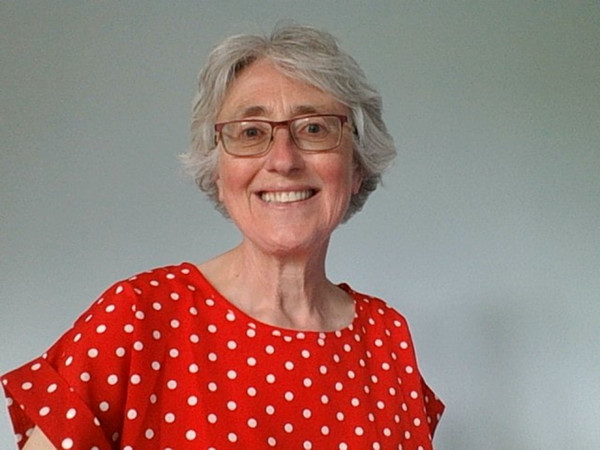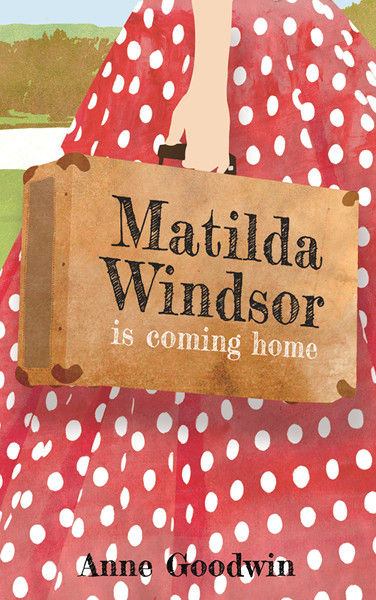
# Please introduce yourself and your book(s)!
I’m Anne Goodwin, a former clinical psychologist, living in a small town in near enough smack in the centre of England, not far from the birthplace of DH Lawrence and the supposed setting for Lady Chatterley’s Lover.
I’m a forty-minute drive from the Peak District National Park, and drew on one of my favourite Peak District walks for a scene of parent-child tension in my debut novel, Sugar and Snails. When the pandemic regulations allow, I guide book-loving walkers through the Derbyshire landscape that inspired Charlotte Brontë’s Jane Eyre.
Nottingham is my nearest city and the main setting for second novel, Underneath. The region’s history of coal mining, and the legacy of the pit closures of the 1980s, inspired the final story in my collection, Becoming Someone.
My fourth book, and third novel, Matilda Windsor Is Coming Home, about a brother and sister separated for fifty years against the backdrop of the long-stay psychiatric hospital closures, is set in Cumbria where I grew up.
I write entertaining fiction about identity, mental health and social justice. I’m the author of three novels and a short story collection published by small independent press, Inspired Quill. My debut novel, Sugar and Snails, was shortlisted for the 2016 Polari First Book Prize.
# What is the real-life story behind your latest book?
I started writing Matilda Windsor Is Coming Home in 2014 but, although I didn’t know it, the seed was sown almost thirty years before. My first job on qualifying as a clinical psychologist was in a long-stay psychiatric hospital. On my first visit to a continuing care ward, housing older women who had been resident in the hospital for many years, the Sister, who had also been there several years and was as institutionalised as the patients, got one of the women to sing me a nursery rhyme. I wondered what kind of crazy place I’d come to.
It was a crazy place, but I had some wonderful colleagues who were committed to creating a more humane and respectful regime. And with the government policy of closing the asylums, we were confident of building better lives for people in less stigmatised settings.

In 2014, I’d just found a publisher for my debut novel, Sugar and Snails, about a woman with a marginalised identity. I was also writing short stories on the theme of identity which became my collection, Becoming Someone. But my interest in identity actually stemmed from my work in mental health and the ways people responded to being given a mental patient identity. Some people found it helpful but, given the stigma, it’s not surprising that many rejected it all together.
Yet within the psychiatric system people who denied they had a mental illness would often be described as deluded, even though delusion can be the best way of coping with an unbearable situation. So I thought it would be interesting to explore the mind’s capacity to banish unpalatable truths within people who’ve been given a psychiatric diagnosis and people who haven’t. When do high hopes become delusions?
The closure of the long-stay psychiatric hospitals around the twentieth century represented a major social change: at the beginning of the twentieth century over 100,000 people were housed in the asylums in England and Wales. While this is well documented in the academic literature, I hadn’t read any novels that accurately portray this transition, so I thought I’d write one!
# What are the biggest mistakes you can make in a book?
In fiction, the author’s personal agenda can kill a novel. While I might hope that my story will change a reader’s mind about a marginalised identity, I never forget that my primary purpose is to entertain.
# How do bad reviews and negative feedback affect you and how do you deal with them?
Like many authors, I internalise the negative more than the positive, but I try to convince myself all feedback is an opportunity to learn. Even the one-star review of my second novel spread across the Internet on the eve of publication taught me it’s impossible to please everyone.
# How has your creation process improved over time?
I’ve always loved reading and wrote stories more or less from when I could hold a pencil, but didn’t have the time, emotional energy or confidence to take writing seriously until around fifteen years ago. Having a successful career that required a fair bit of (non-fiction) writing, I didn’t realise how much I had to learn to make a success of fiction. My first two published novels, took seven years from inception to publication. My third novel took six months less, so perhaps I’ve got slightly faster!
But I hope I’ve developed technically with each book. I’ve become substantially better at self-editing (although each of my books has also been professionally edited) and I’m one of those rare authors who enjoys it. (But how can you not enjoy improving on your original words?)
# What was the best, worst and most surprising thing you encountered during the process of completing your latest book, Matilda Windsor Is Coming Home?
The humour in my most recent took me completely by surprise. I set out to write a serious story about a girl who is orphaned at thirteen, pregnant by the end of her teens, and forced to give up her baby for adoption. Then she’s stuck in an asylum for fifty years. Since it was inspired by my own experience of working as a clinical psychologist and long-stay psychiatric hospital, I was devastated when I discovered my character was actually funny. It felt distinctly unprofessional to make mental ill-health a laughing matter.
However, once I accepted the humour wasn’t going to go away, I embraced it. That enabled me to shift the comic focus from my central character, Matty, a long-term patient, onto the madness of the supposedly sane. Feedback from readers shows they don’t find the humour dilutes the tragedy, but makes it easier to confront it. It’s made it a much better book.
# Do you tend towards personal satisfaction or aim to serve your readers? Do you balance the two and how?
I aspire to write the novels I’d like to read, and I read primarily literary and book group fiction. I’d probably have more readers if I chose a more popular genre, such as crime or romance, but I won’t spend years on a novel if it doesn’t interest me.
But I’m happy to cut paragraphs, chapters and characters that don’t serve the overall story. I think the best way I can serve readers is by telling an interesting story in the most economical way.
# What are your plans for future books?
Much as I dislike sequels, I’m working on a follow-up to Matilda Windsor Is Coming Home that will also serve as a stand-alone.
Working on edits during the first lockdown in 2020, I assumed my character, Matty, would be dead. After all, a lifetime of drugs and incarceration isn’t a recipe for longevity. But what if Matty was living on in a care home, approaching her hundredth birthday, expecting a big party?
I began working on a follow-up to keep me sane during lockdown, but the story took off. It won’t happen soon, but I’m looking forward to sharing 100 Candles, 100 Days (provisional title) with readers old and new.
Find out more about Anne Goodwin via her website https://annegoodwin.weebly.com/
To purchase a copy and/or to find out more about Matilda Windsor Is Coming Home check her linktree https://linktr.ee/matildawindsor